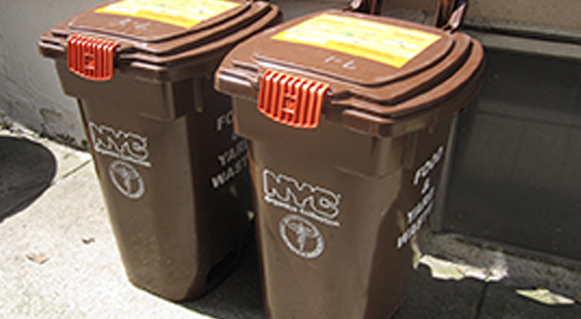What you should know about the Organics Recycling Program: In the fall of 2012, the Department of Sanitation (DSNY) began offering curbside collection of organic waste to select NYC schools, residences, and institutions. In 2013, the pilot program was codified into law by Local Law 77 of 2013, requiring DSNY to carry out the pilot through July 2015. The program is strictly voluntary.
Why: Organic waste accounts for about 31% of all waste generated by residents in New York City. Organic waste is yard waste, food scraps, compostable paper (napkins, paper plates, etc.), and other materials suitable for industrial-scale composting. Operating a curbside organics collection program can help NYC reduce millions of dollars in landfill disposal costs, achieve recycling goals, and reduce pests by storing food waste in special rodent-resistant bins. NYC will turn your organic waste into compost, which can be used to fertilize gardens, parks, and street trees, or into renewable energy which can be used to power thousands of homes.
Acceptable Materials: All Food:
vegetables & fruit • prepared foods • baked goods • cereal • flour & grains • pasta & rice • nuts • eggs & eggshells • dairy products • meat • fish • bones
Food-Soiled Paper: paper towels •napkins • paper plates • coffee filters & tea bags • paper lunch sacks •
paper food boats and trays
Leaf & Yard Waste: Small amounts of leaf and yard waste are OK to put in the brown bin. Put extra yard waste in paper lawn & leaf bags, any rigid container, bundles, or clear plastic recycling bags (least preferred option since plastic is not compostable). lawn & leaf waste • leaves • garden trimmings • grass clippings • yard waste
Unacceptable Materials: Please do not place the following materials in your organics bin.
NO plastic: plastic shopping bags, plastic wrap or food wrappers, plastic utensils, fruit & veg stickers, containers, or packaging. The only exceptions are usage of certified- compostable plastic bags to collect food scraps, and clear plastic recycling bags to line the outdoor brown bin only. See more about the usage of bags, liners, and compostable plastics during the pilot.
NO designated recyclables: no metal, glass, plastics, or cartons; no clean cardboard or paper. Find out what to recycle with Sanitation.
NO trash: no animal waste (kitty litter, poop, carcasses), cigarette butts or ashes, hygiene or medical items (band-aids, feminine products, diapers)
NO clothing/textiles: Apartment buildings can sign up for re-fashioNYC, the city’s free clothing reuse program.
NO electronics or batteries: Apartment buildings can sign up for e-cycleNYC, the city’s free electronics recycling program.
NO liquids. Small amounts of grease, fat, or oils ok. If you collect grease in a jar, seal the jar and place it in the trash.
NO foam items. Read more about foam plastics and their place in NYC’s waste stream.
Participating residents can follow these steps:
1. Separate organic waste from your trash and other recyclables.
– Collect your food scraps and food-soiled paper in your kitchen container, or in any container or bag.
– Store your container or bag in a convenient place, like on the countertop, under the sink, or in the freezer.
– If you want, line your container with an acceptable bag or liner for easy clean-up.
2. Empty organic waste into your brown bin.
– If you choose to line your outdoor bin, use acceptable bags and liners.
3. Set out brown bin and yard waste at the curb for collection.
Organics are collected once per week on your regular recycling day. Find your regular recycling day using your address.
When your recycling day falls on a holiday, set out your organic waste and trash after 5 pm ON THAT holiday for collection starting the next day, which may occur earlier or later than usual. All other recyclables will be collected the following week on your regular recycling day.
Tips for Managing Organic Waste Maintaining Your Kitchen Collector One of the most effective ways to prevent insects (and odor) is to store food scraps in your freezer or refrigerator before discarding them in your brown bin. This prevents food waste from rotting.
Inside your home, empty and wash your kitchen collector regularly. The free one provided by DSNY is dishwasher safe.
Lining the collector with an approved liner will make cleaning up easier.
Wrap meat and seafood scraps and wet organic materials in newspaper or paper
towels.
Clean out the refrigerator the day before collection, rather than the day after.
Maintaining Your Brown Organics Bin
The brown bins are specially designed with raccoon-proof latches and other features to keep out rodents and pests. Traditionally, food waste is mixed with garbage and left on the curb in BAGS overnight, where it is easily accessed by rodents, raccoons, and bugs. DSNY’s organics program helps solve this problem by having residents dispose of food waste in a specially designed heavy-duty organics container with a lid that latches shut.
Outside, make sure you keep the brown bin latched and in a shaded, ventilated area, especially during warm weather.
Insects and rodents can be attracted by odors, which arise when there is too much moisture in your bin. Reduce moisture by adding paper, shredded newspaper, cardboard, or leaves to the brown bin.
Lining the brown bin with an approved liner will make cleaning up easier.
Rinse out brown bin occasionally with baking soda and water or diluted vinegar.
Line the outer rim of the bin with salt or vinegar to repel flies, or sprinkle rock salt or garden lime inside the brown bin.
Flies are also repelled by herbs such as camphor, eucalyptus, mint, or bay leaves. Hang bruised leaves inside the bin or apply drops of herbal oil to the outside of the bin.
Sprinkle baking soda in the container and bin to reduce odors.
To prevent material from sticking or freezing to the bottom of the bin, line the
bottom with an approved liner.



